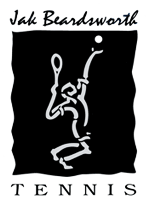
JAK'S MONTHLY ESSAY SERIES: Achieving Your Personal Best
Older Essays
- March 2024 - Get Your JuJu On
[read more] - February 2024 - Giving Opponents too Much Respect
[read more] - January 2024 - Rally Ball Or Pull The Trigger
[read more] - December 2023 - The Forgotten Stop Volley
[read more] - November 2023 - "You're Only as Good as Your Second Serve"
[read more]
Essay Archives
Click a year to view more essays
2023
- October 2023 - good misses vs bad misses
[read more] - September 2023 - Why good players are good players!
[read more] -
August 2023 - On poaching and fake poaching: Becoming a Force at the Net in Doubles
[read more] -
July 2023 - The Beautiful Game is Getting Ugly
[read more] -
June 2023 - The Approach Dropper: Lob Killer
[read more] -
May 2023 - Why club players don't practice
[read more] -
April 2023 - DON'T FIGHT TIGHT
[read more] -
March 2023 - Classic finish line failure
[read more] -
February 2023 - Defending the lob over your net partner - The "Switch"
[read more]
2022
-
December 2022 - E. I. D. - Extended Impact Duration
[read more] -
November 2022 - Movement Enhancement to Stay Better In-Point Connected
[read more] -
September 2022 - Advanced Visualization 301
[read more] -
August 2022 - Tennis' uniqueness: warming-up the enemy
[read more] -
July 2022 - Extracting Double Faults Through Receiving Positions... and more
[read more] -
June 2022 - Consider Serve and Volley
[read more] -
May 2022 - How the Toss Primes the Serve Relaxation Pump
[read more] -
April 2022 - Ball Watching and Science
[read more] -
March 2022 - Caving
[read more] -
February 2022 - Kenny G and Emmo
[read more] -
January 2022 - The Knees
[read more]
2021
-
December 2021 - The Match is with You
[read more] -
November 2021 - The Backup Racket in Your Bag
[read more] -
October 2021 - Every Tennis Player Can and Should Have a Weapon
[read more] -
September 2021 - LEARNING NEW SKILLS: First the Process, Then the Results
[read more] -
August 2021 - The Challenge of Visualizing… For Some
[read more] -
July 2021 - Playing with both your feet and your hands
[read more] -
June 2021 - Finding the Range
[read more] -
May 2021 - The Focus
[read more] -
April 2021 - About Your Butt Cap
[read more] -
March 2021 - The Essential Forehand and Backhand
[read more] -
February 2021 - On Being a Doubles All-Courter
[read more] -
January 2021 - Same Grip Volleying Myths
[read more]
2020
-
December 2020 - On mechanics and style
[read more] -
November 2020 - THE BIG 3: The Glue That Keeps Your Best Game Together
[read more] -
September 2020 - Protocol and Game Tradition Revisited
[read more] -
August 2020 - As Good as Your 2nd Serve
[read more] -
July 2020 - Shot Shaping
[read more] -
June 2020 - Getting a Point in Jeopardy Back to Neutral
[read more] -
May 2020 - A Positive Mind-Set: On and Off the Court in Today's C-19 Reality
[read more] -
April 2020 - The Zombie Tennis Creed – Top Ten
[read more] -
March 2020 - A Roadmap Into "The Zone"
[read more] -
February 2020 - The service toss: myths and realities
[read more] -
January 2020 - Shot Gazing
[read more]
2019
-
December 2019 - The Dreaded High Bouncing Moonball Dilemma
[read more] - November 2019 - Chalk Flew: Troublesome Line Calling without Hawkeye in Clubland [read more]
- October 2019 - In the Spirit of Don't Drink and Drive… Don't Think and Hit [read more]
- September 2019 - Old School vs New School [read more]
- August 2019 - Getting the Ball Where You Want It [read more]
- July 2019 - Taking Points Off…What? [read more]
- June 2019 - Confidence Is Confidence: Take It Wherever You Can Get It [read more]
- May 2019 - TENNIS INNOVATION IMPLODES [read more]
- April 2019 - Defending the Court with Older Bones: A Club Player's Guide to Saying "Nice Shot" Less [read more]
- March 2019 - Do You Have Doubles Rally Tolerance? [read more]
- February 2019 - I Knew Jimy Van Alen: A Historical Look Back [read more]
- January 2019 - The Mind is a Terrible Thing to Waste: Mental Toughness Skills [read more]
2018
- December 2018 - Less Bling is the Thing [read more]
- November 2018 - Anatomy of a Doubles Serve Return…from the Inside Out [read more]
- October 2018 - Older Dogs and New Tricks: Still Improving at Any Age [read more]
- September 2018 - The All-Important Dynamic of Gripping [read more]
- August 2018 - The Cinemascope Syndrome: Undermining Your Ball Watching [read more]
- June 2018 - Serving and Returning Better with a Quiet Eye [read more]
- May 2018 - The Man Who Breathed for Two [read more]
- January 2018 - Rituals Anyone? [read more]
2017
- December 2017 - Why Serving is so Difficult in Clubland [read more]
- October 2017 - Managing your body and mind in tennis space [read more]
- August 2017 - Why Bother Breathing to Improve Your Game [read more]
- May 2017 - The "Maintaining" One's Game as One Ages Fallacy [read more]
- February 2017 - Punta Gorda Tennis Clubs: Setting the Bar [read more]
- January 2017 - State of the Club Game: The Growing Death of Sportsmanship [read more]
